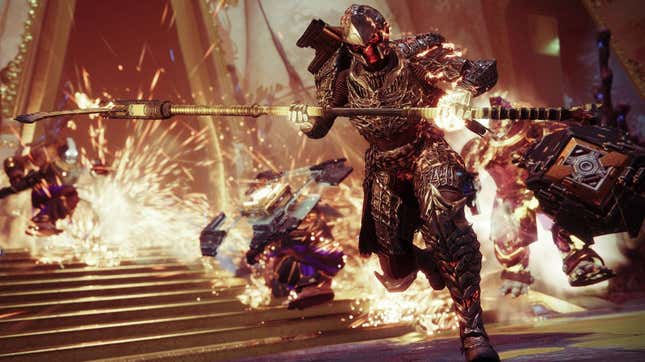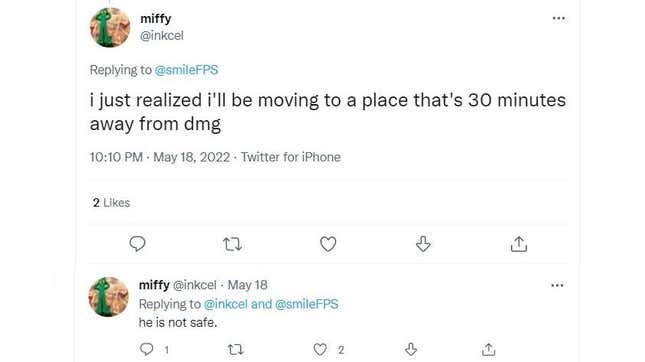
Bungie is taking a Destiny 2 troll to court. The freshly minted PlayStation studio filed a lawsuit last Friday accusing one of the loot shooter’s players of serially cheating and harassing its developers. The complaint comes as toxic elements within the Destiny fanbase have led Bungie to be more tight-lipped about its decision making and future plans in the popular live service game.
The complaint, filed in the U.S. Western District Court of Washington, and the lastest in a spree of recent legal action by the studio, names Luca Leone as the sole defendant and accuses him of habitually violating Destiny 2’s Limited Software License Agreement (LSLA). According to Bungie, Leone was banned over a dozen times for livestreaming the game while using cheat software and was also involved in allegedly selling Destiny 2 emblems, including ones that were possibly from stolen accounts. Leone also threatened Bungie’s community manager.
“#NewProfilePic,” tweeted the account inkcel on May 18 alongside an image of Destiny 2 community manager dmg04's employee badge (Bungie traced the account back to Leone via a shared email address with the one he used to order merchandise with). “i just realized i’ll be moving to a place that’s 30 minutes away from dmg,” Leone wrote in a follow-up tweet. And then in a third: “he is not safe.

Then on July 4 a Twitter user asked if anyone in the Seattle area was available to commit arson in the next 72 hours. Leone responded by volunteering. “If it’s Bungie HQ you get a discount btw,” he wrote. On July 5 Leone tweeted for Bungie to “keep [its] doors locked.”
Leone did not immediately respond to a request for comment, but did begin deleting the past tweets.
While the studio is asking the court for $150,000 in damages, it’s also requesting the court block Leone from “harassing, stalking, or otherwise engaging in unwanted or unsolicited contact with Bungie, its employees, or Destiny 2 players.” It’s not clear how the case will unfold, but it’s already underlining ongoing discussions over how the people who play Destiny 2 interact with the people who make it.
Destiny 2’s genre-defining success has made it the envy of others in the gaming industry, but it’s also created a very unique relationship with the player-base. A seasonal model encourages fans to routinely check back for new content and updates, and Bungie publishes a blog post every week updating the community on recent changes and future plans. At times the player-developer collaboration is very vibrant. Other times it can be incredibly harsh as loud voices rail against particularly polarizing design decisions.
And occasionally it can be downright toxic. That’s what happened at the end of May when sandbox design lead Kevin Yanes wrote on Twitter that fan-favorite Titan Exotic armor Twilight Garrison would never reprise its role from the first game in Destiny 2. “Titans will never get air dodge back my guy, it’s part of the warlock identity,” he responded to one player. “Sorry but I want to rip that bandaid off.”
The comment became a lightning rod for vitriol, and Yanes was forced to temporarily shut down his account. Those at Bungie and in the community rallied around Yanes to call out the behavior. “It’s a game designer’s job to weigh the needs of the many over the wants of the few,” wrote senior design lead Tom Farnsworth. “Of course, constructive feedback is part of this process, but we don’t put up with abuse.”
As Forbes’ Paul Tassi points out, Yanes was one of a number of “chatty” Bungie developers willing to discuss the game on social media. Now Yanes exclusively retweets posts about non-gaming subjects, and anecdotally it feels like others at Bungie have pulled back as well. Community manager dmg04 said as much over the weekend.
One player tweeted that Destiny 2’s PVP modes, long a sore spot for the game and also believed to be the source of some of its more toxic players, would prosper if Bungie included weekly chats on the topic in its blog posts. “I’m not sayin I don’t want udpates,” responded Twitch streamer Falloutplays. “But we’ve bitten the hand that feeds us too hard, too often.”
Community manager Dmg04 agreed. “I dream of a day where videogame developers (from any studio) can openly discuss their work without being harassed,” he wrote in a reply to Falloutplay’s comment. “Cases of harassment against our developers have actively made it harder for us to communicate with the broader community. It has impacted more studios than just ours.”
While lots of games deal with toxicity issues, few remain as vocal with their communities as Bungie historically has. This was part of what made it extra notable in recent seasons when the studio tried to keep hints of new reveals in The Witch Queen and “Season of the Haunted” to a minimum before they finally went live in the game.
“Can we just fucking nuke the idea that Bungie doesn’t communicate enough from orbit already?,” wrote one player. “They could just be like 90% of other devs and not communicate outside of patch notes ever.”
And as dmg04 and others have pointed out, fan harassment is not exclusive to Bungie. Last year, Naught Dog devs were attacked after some players took issue with elements of The Last Of Us Part II revealed in pre-release leaks. More recently, developers at Sony Santa Monica were threatened over God of War: Ragnarök still not having an official release date at the end of June (it got one a week later). 2022 also marks the 10-year anniversary of Mass Effect 3 and the abuse heaped on its creators over the ending.
“Many in the comments say they do not condone harassment,” dmg04 wrote over the weekend. “I hope they also stand against it when they find that friends or family are engaging in it.”